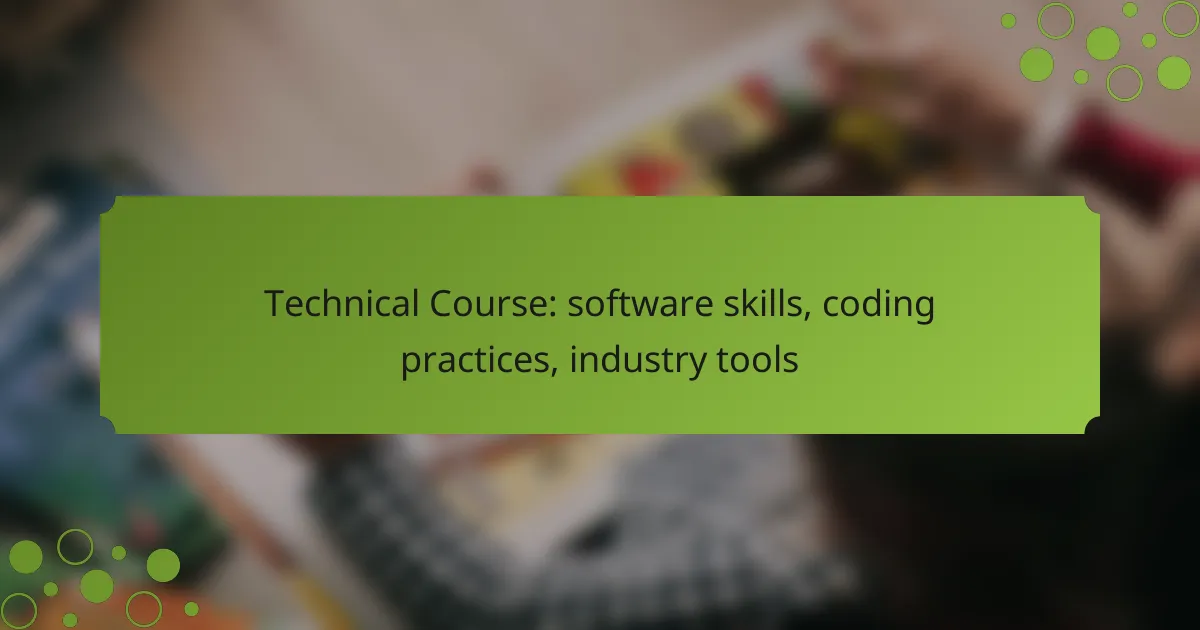Short courses in Canada provide an efficient way to acquire new skills and knowledge through concise content and flexible schedules. Ideal for busy individuals, these programs allow learners to progress at their own pace, making education accessible and tailored to diverse needs. With platforms like Coursera, edX, and Udemy, you can easily find a course that fits your interests and schedule.

What are the benefits of short courses in Canada?
Short courses in Canada offer a range of benefits including quick skill acquisition, flexible scheduling, and concise content delivery. These programs are designed for individuals seeking to enhance their knowledge and skills without committing to lengthy degree programs.
Quick learning opportunities
Short courses provide rapid learning opportunities, often lasting a few weeks to a few months. They focus on specific skills or knowledge areas, allowing participants to gain expertise quickly and apply it in real-world scenarios.
For example, a short course in digital marketing might cover essential tools and strategies in just six weeks, enabling learners to start implementing their new skills almost immediately.
Flexible scheduling options
Many short courses in Canada offer flexible scheduling, accommodating busy lifestyles. Options may include evening classes, weekend workshops, or online formats that allow learners to study at their own pace.
This flexibility is particularly beneficial for working professionals or students who need to balance education with other commitments. Look for programs that offer asynchronous learning to maximize convenience.
Concise content delivery
Short courses prioritize concise content delivery, focusing on key concepts and practical applications. This approach helps learners absorb information quickly without unnecessary filler.
For instance, a course on project management might distill essential methodologies into a few focused sessions, ensuring that participants leave with actionable insights rather than overwhelming details.
Cost-effective education
Short courses are often more affordable than traditional degree programs, making them a cost-effective option for skill enhancement. Tuition fees can vary, but many courses are priced in the low hundreds to low thousands of Canadian dollars.
Additionally, the shorter duration means learners can quickly return to the workforce or advance in their careers without incurring significant debt. Always compare costs and potential return on investment when selecting a course.

How do online short courses work?
Online short courses provide a flexible way to learn specific skills or knowledge quickly, often through a series of concise modules. They typically allow learners to progress at their own pace, making education accessible to a wider audience.
Self-paced learning modules
Self-paced learning modules are a core feature of online short courses, allowing students to complete lessons according to their own schedules. This flexibility means that learners can balance their studies with work or personal commitments, making it easier to fit education into busy lives.
Many courses are structured into bite-sized lessons that can be completed in short sessions, often ranging from 15 to 30 minutes. This modular approach helps maintain engagement and allows for quick mastery of topics.
Access to digital resources
Enrolling in an online short course typically grants access to a variety of digital resources, such as eBooks, articles, and videos. These materials enhance the learning experience by providing diverse perspectives and in-depth information on course topics.
Students may also benefit from supplementary resources like quizzes and discussion forums, which can reinforce learning and facilitate interaction with peers. It’s advisable to take full advantage of these materials to maximize understanding and retention.
Interactive learning environments
Many online short courses incorporate interactive elements to foster engagement and enhance learning. Features such as live webinars, discussion boards, and group projects encourage collaboration and provide opportunities for real-time feedback.
Utilizing these interactive environments can significantly improve the learning experience. Engaging with instructors and fellow students can clarify concepts and deepen understanding, making it essential to participate actively in these components.

Which platforms offer short courses in Canada?
Several platforms provide short courses in Canada, catering to various learning needs and schedules. Popular options include Coursera, edX, Udemy, and LinkedIn Learning, each offering a range of subjects and flexible learning formats.
Coursera
Coursera partners with universities and organizations to offer short courses that can be completed at your own pace. Many courses are free to audit, while certificates and specializations may require a fee, typically ranging from CAD 50 to CAD 300.
Courses cover diverse topics, from business to technology, and often include video lectures, quizzes, and peer-reviewed assignments. Consider checking for financial aid options if the cost is a barrier.
edX
edX provides access to short courses from top universities and institutions, allowing learners to explore subjects like data science, humanities, and engineering. Many courses are free to audit, but verified certificates usually cost between CAD 50 and CAD 200.
edX features a user-friendly interface and offers MicroMasters and Professional Certificate programs for those looking to deepen their expertise. Be mindful of course start dates and completion timelines to maximize your learning experience.
Udemy
Udemy is a marketplace for short courses created by independent instructors, covering a wide range of topics from coding to photography. Prices vary significantly, often between CAD 20 and CAD 200, with frequent discounts available.
Courses are typically self-paced, allowing for flexible learning. Look for courses with high ratings and reviews to ensure quality, and consider checking for lifetime access to course materials for ongoing reference.
LinkedIn Learning
LinkedIn Learning offers a vast library of short courses focused on professional development, including skills in software, leadership, and creative fields. A subscription model is used, costing around CAD 30 per month, which provides unlimited access to all courses.
Courses are designed to be concise and practical, often featuring video tutorials and exercise files. Take advantage of the free trial to explore the platform and identify courses that align with your career goals.

What criteria should I consider when choosing a short course?
When selecting a short course, consider factors such as course accreditation, instructor qualifications, and course reviews. These criteria can significantly impact the quality of your learning experience and the value of the certification you may receive.
Course accreditation
Course accreditation ensures that the program meets specific educational standards and is recognized by employers and industry professionals. Look for courses accredited by reputable organizations or institutions, as this can enhance your resume and validate your skills.
In some regions, such as the European Union, accredited courses may also be necessary for certain professions. Verify the accreditation status through the course provider’s website or by contacting relevant educational authorities.
Instructor qualifications
The qualifications of instructors can greatly influence the effectiveness of a short course. Check their educational background, professional experience, and any certifications they hold related to the course subject. Instructors with real-world experience often provide valuable insights that enhance learning.
Additionally, consider the instructor’s teaching style and feedback from previous students. A qualified instructor who engages with learners can make a significant difference in your understanding of the material.
Course reviews and ratings
Reviews and ratings from past participants can offer insights into the course’s strengths and weaknesses. Look for feedback on the course content, delivery, and overall satisfaction. Platforms like Course Report or Trustpilot can be helpful in finding aggregated reviews.
When evaluating reviews, pay attention to comments about the course’s relevance to your goals and the practical applications of the material. A course with consistently high ratings is often a safer choice for your investment of time and money.

How much do short courses cost in Canada?
Short courses in Canada typically range from a few hundred to a few thousand Canadian dollars, depending on the institution, course length, and subject matter. Many courses offer flexible scheduling, allowing learners to choose options that fit their needs and budgets.
Average pricing ranges
The cost of short courses in Canada can vary significantly. Generally, you can expect to pay between CAD 200 and CAD 2,000. For instance, online courses may be on the lower end, while specialized workshops or certifications can reach higher prices.
Factors influencing pricing include the course provider, the complexity of the subject, and whether materials are included. Always check if there are additional fees for resources or exams.
Financial aid options
Many Canadian institutions offer financial aid for short courses, including scholarships, grants, and payment plans. Some organizations provide funding specifically for adult learners or those pursuing career development.
It’s advisable to inquire directly with the course provider about available financial assistance. Additionally, government programs may offer support for skills training, which can help offset costs.
Subscription models
Some educational platforms in Canada have adopted subscription models, allowing learners to access multiple courses for a monthly fee. This can be a cost-effective option if you plan to take several courses over time.
Typically, subscription fees range from CAD 30 to CAD 100 per month. Evaluate the course offerings and ensure they align with your learning goals before committing to a subscription.

What are the most popular subjects for short courses?
Short courses cover a wide range of subjects, with some of the most popular including technology, business, health, and personal development. These courses are designed for quick learning and often feature concise content that fits into flexible schedules.
Technology
Technology-related short courses are in high demand, especially in areas like coding, data analysis, and cybersecurity. Many individuals seek to enhance their skills to stay competitive in the job market or to pivot into tech careers.
Popular platforms offer courses in programming languages such as Python and JavaScript, often ranging from a few weeks to a couple of months. Consider starting with beginner-friendly courses that provide hands-on projects to solidify your learning.
Business
Short courses in business often focus on essential skills like project management, marketing, and entrepreneurship. These courses cater to professionals looking to advance their careers or start their own businesses.
Many business courses are available online and can be completed in a matter of weeks. Look for programs that offer practical case studies and networking opportunities to maximize your learning experience.
Health
Health-related short courses cover topics such as nutrition, mental health, and first aid. These courses appeal to individuals interested in personal wellness or those pursuing careers in healthcare.
Courses in this field typically range from a few hours to several weeks. Certifications in first aid or CPR, for instance, can often be completed in a single day, making them accessible for busy schedules.
Personal Development
Personal development courses focus on skills like communication, leadership, and time management. These subjects attract individuals looking to improve their personal effectiveness and interpersonal skills.
Many of these courses are designed to be completed quickly, often within a few days or weeks. Engaging in workshops or online seminars can provide immediate benefits and actionable strategies for personal growth.



